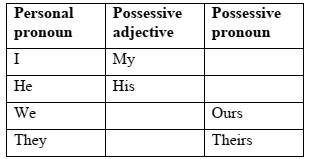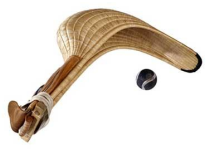Questões de Concurso
Para prefeitura de louveira - sp
Foram encontradas 824 questões
Resolva questões gratuitamente!
Junte-se a mais de 4 milhões de concurseiros!
Leia o texto a seguir e responda a questão.
“He remembered the time he had hooked one of a pair of marlin. The male fish always let the female fish feed first and the hooked fish, the female, made a wild, panic-stricken, despairing fight that soon exhausted her, and all the time the male had stayed with her, crossing the line and circling with her on the surface.
He had stayed so close that the old man was afraid he would cut the line with his tail which was sharp as a scythe and almost of that size and shape. When the old man had gaffed her and clubbed her, holding the rapier bill with its sandpaper edge and clubbing her across the top of her head until her colour turned to a colour almost like the backing of mirrors, and then, with the boy’s aid, hoisted her aboard, the male fish had stayed by the side of the boat.
Then, while the old man was clearing the lines and preparing the harpoon, the male fish jumped high into the air beside the boat to see where the female was and then went down deep, his lavender wings, that were his pectoral fins, spread wide and all his wide lavender stripes showing. He was beautiful, the old man remembered, and he had stayed.”
HEMINGWAY, Ernest. The Old Man and the Sea.
Eua: Hueber Verlag, 1952. 108 p.
“the male fish jumped high into the air beside the boat to see where the female was and then went down deep, his lavender wings, that were his pectoral fins,”
O trecho destacado acima tem a função de:
Leia o texto a seguir e responda a questão.
“He remembered the time he had hooked one of a pair of marlin. The male fish always let the female fish feed first and the hooked fish, the female, made a wild, panic-stricken, despairing fight that soon exhausted her, and all the time the male had stayed with her, crossing the line and circling with her on the surface.
He had stayed so close that the old man was afraid he would cut the line with his tail which was sharp as a scythe and almost of that size and shape. When the old man had gaffed her and clubbed her, holding the rapier bill with its sandpaper edge and clubbing her across the top of her head until her colour turned to a colour almost like the backing of mirrors, and then, with the boy’s aid, hoisted her aboard, the male fish had stayed by the side of the boat.
Then, while the old man was clearing the lines and preparing the harpoon, the male fish jumped high into the air beside the boat to see where the female was and then went down deep, his lavender wings, that were his pectoral fins, spread wide and all his wide lavender stripes showing. He was beautiful, the old man remembered, and he had stayed.”
HEMINGWAY, Ernest. The Old Man and the Sea.
Eua: Hueber Verlag, 1952. 108 p.
“When the old man had gaffed her and clubbed her, holding the rapier bill with its sandpaper edge.”
A expressão destacada no trecho acima pode ser traduzida como:
Leia o texto a seguir e responda a questão.
“He remembered the time he had hooked one of a pair of marlin. The male fish always let the female fish feed first and the hooked fish, the female, made a wild, panic-stricken, despairing fight that soon exhausted her, and all the time the male had stayed with her, crossing the line and circling with her on the surface.
He had stayed so close that the old man was afraid he would cut the line with his tail which was sharp as a scythe and almost of that size and shape. When the old man had gaffed her and clubbed her, holding the rapier bill with its sandpaper edge and clubbing her across the top of her head until her colour turned to a colour almost like the backing of mirrors, and then, with the boy’s aid, hoisted her aboard, the male fish had stayed by the side of the boat.
Then, while the old man was clearing the lines and preparing the harpoon, the male fish jumped high into the air beside the boat to see where the female was and then went down deep, his lavender wings, that were his pectoral fins, spread wide and all his wide lavender stripes showing. He was beautiful, the old man remembered, and he had stayed.”
HEMINGWAY, Ernest. The Old Man and the Sea.
Eua: Hueber Verlag, 1952. 108 p.
“Then, while the old man was clearing the lines and preparing the harpoon”
Assinale a alternativa que apresenta, corretamente, a frase acima em sua forma de voz passiva:
Leia o texto a seguir e responda a questão.
“He remembered the time he had hooked one of a pair of marlin. The male fish always let the female fish feed first and the hooked fish, the female, made a wild, panic-stricken, despairing fight that soon exhausted her, and all the time the male had stayed with her, crossing the line and circling with her on the surface.
He had stayed so close that the old man was afraid he would cut the line with his tail which was sharp as a scythe and almost of that size and shape. When the old man had gaffed her and clubbed her, holding the rapier bill with its sandpaper edge and clubbing her across the top of her head until her colour turned to a colour almost like the backing of mirrors, and then, with the boy’s aid, hoisted her aboard, the male fish had stayed by the side of the boat.
Then, while the old man was clearing the lines and preparing the harpoon, the male fish jumped high into the air beside the boat to see where the female was and then went down deep, his lavender wings, that were his pectoral fins, spread wide and all his wide lavender stripes showing. He was beautiful, the old man remembered, and he had stayed.”
HEMINGWAY, Ernest. The Old Man and the Sea.
Eua: Hueber Verlag, 1952. 108 p.
Leia o texto a seguir e responda a questão.
“He remembered the time he had hooked one of a pair of marlin. The male fish always let the female fish feed first and the hooked fish, the female, made a wild, panic-stricken, despairing fight that soon exhausted her, and all the time the male had stayed with her, crossing the line and circling with her on the surface.
He had stayed so close that the old man was afraid he would cut the line with his tail which was sharp as a scythe and almost of that size and shape. When the old man had gaffed her and clubbed her, holding the rapier bill with its sandpaper edge and clubbing her across the top of her head until her colour turned to a colour almost like the backing of mirrors, and then, with the boy’s aid, hoisted her aboard, the male fish had stayed by the side of the boat.
Then, while the old man was clearing the lines and preparing the harpoon, the male fish jumped high into the air beside the boat to see where the female was and then went down deep, his lavender wings, that were his pectoral fins, spread wide and all his wide lavender stripes showing. He was beautiful, the old man remembered, and he had stayed.”
HEMINGWAY, Ernest. The Old Man and the Sea.
Eua: Hueber Verlag, 1952. 108 p.
François Gouin, francês, professor de latim do final dos anos 1800, decidiu aprender alemão e, para isso, morou em Hamburgo por um ano. Ao invés de comunicar-se com falantes de alemão, Gouin fez sequências de tentativas de dominar a língua através de técnicas como memorizar uma gramática da língua alemã e uma tabela de verbos irregulares. Ao ir para a universidade testar seus conhecimentos, percebeu que não conseguia compreender nenhuma palavra na língua. Ele retornou ao isolamento e continuou em sua árdua tarefa de memorização de regras e tradução de clássicos de Goethe e Schiller, porém ao tentar estabelecer comunicação oral com falantes da língua continuou sem êxito. Tais experiências mostraram a François Gouin o absurdo do Método Tradicional, fazendo com que ele, após falhar, voltasse para casa.
Após retornar para seu país e observar os avanços que seu sobrinho de três anos tinha obtido na aquisição de sua língua materna, Gouin percebeu que o aprendizado de uma língua é “primeiramente uma questão de transformar percepções em conceitos. As crianças usam a língua para representar seus conceitos. A língua é uma maneira de pensar, de representar o mundo para alguém.” (BROWN, 2007, p. 20, tradução da autora).
François Gouin foi responsável pela criação de qual metodologia de ensino de língua estrangeira?
Observe as sentenças a seguir:
I - For now on you have your own bedroom.
II - My father was a bus driver for 10 years.
III - My mother-in-law is very sweet.
Assinale a alternativa correta:
Observe a tabela a seguir:

Assinale a alternativa que preenche corretamente os espaços em branco na tabela acima:
Observe a estrutura verbal a seguir:
• Sujeito + simple future do verbo to have (will have) + o particípio do verbo principal.
A estrutura verbal apresentada acima é a representação de qual tempo verbal?
Observe as sentenças abaixo:
I - My father always was an honest man.
II - He built a hospital downtown.
III - Today, his hospital is also a university
Assinale a alternativa correta:
Observe as sentenças a seguir:
I - The crime happened right here.
II - The party will be on my house.
III - The TV is still inside the box.
Assinale a alternativa correta:
Observe as afirmativas a seguir:
I - A competência gramatical diz respeito ao domínio da língua, entendida como um sistema, englobando os conhecimentos fonológicos, morfológicos, sintáticos e semânticos, além de pronúncia e ortografia.
II - A competência sociolinguística compreende os fatores de uso da língua em diferentes contextos, depende de fatores contextuais como o status dos participantes, o propósito da interação, além das normas e convenções dos grupos sociais e do repertório do indivíduo.
III - A competência interpessoal diz respeito a capacidade de viver em sociedade, à interação dos seres falantes da língua e como eles usam a língua para se comunicarem entre si formando, assim, ciclos sociais.
Sobre as competências da abordagem comunicativa, assinale a alternativa correta:
A teoria de aprendizagem desta abordagem consiste no tipo de hábito de aprendizagem. Para tanto, utiliza-se de frases previamente prontas, que são apresentadas aos alunos e relacionadas a diferentes situações ou contextos para que esses as memorizem e repitam. Desse modo, frases já prontas são apresentadas aos alunos, sendo relacionadas a diferentes situações ou contextos para que os alunos as memorizem e repitam. Esses exercícios de repetição são referidos como ‘drills’.
O texto acima se refere a qual das abordagens e métodos de ensino de língua inglesa?
Esta abordagem, defendida pelos PCNs (Parâmetros Curriculares Nacionais) para o ensino de língua estrangeira, visa desenvolver a competência linguística através da comunicação, da troca de experiência, da relação construída por meio do convívio entre os seres. Enfatiza situações reais condicionadas ao uso da segunda língua e parte do princípio da reflexão ao utilizar diferentes gêneros textuais.
O texto acima se refere a qual das abordagens e métodos de ensino de língua inglesa?
Observe a imagem:

Os equipamentos demonstrados, são utilizados em qual das modalidades esportivas, citadas?